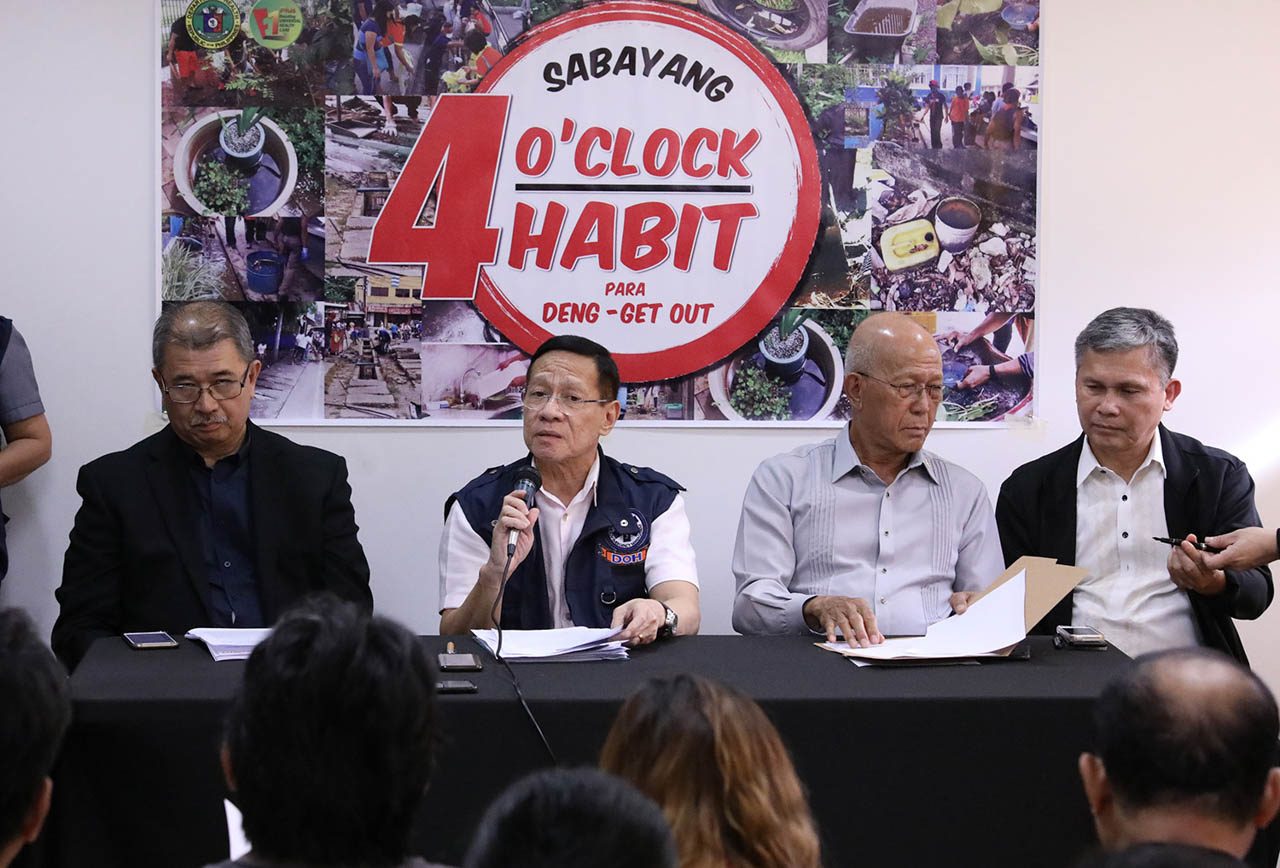SUMMARY
This is AI generated summarization, which may have errors. For context, always refer to the full article.

MANILA, Philippines – The Department of Health (DOH) on Tuesday, August 6, declared a national dengue epidemic as cases of the mosquito-borne disease continued to rise in the country.
According to the DOH, 622 people have died due to dengue as of July 20 this year. These deaths came from the 146,062 dengue cases from January to July – a number 98% higher than the recorded incidence during the same period last year.
Health secretary Francisco Duque III said that declaring a national epidemic is important “to identify where a localized response is needed and to enable local government units to use their Quick Response Fund to address the epidemic situation.”
Based on DOH data, Western Visayas had the highest number of cases, with 23,330 for the first 7 months of the year. This is followed by Calabarzon with 16,515, Zamboanga Peninsula with 12,317, Northern Mindanao with 11,455, and Soccsksargen with 11,083.
Two other regions have breached the epidemic threshold: Bicol region, which has had 3,470 cases in the last 3 weeks, and Eastern Visayas with 7,199 cases.
The DOH in July had declared a national dengue alert, but the status was raised to epidemic to “level up the response” against the viral disease.
‘Deng-get out’
The health department on the same day launched the “Sabayang 4-o’clock Habit para Deng-Get Out,” which will focus on the destruction of mosquito breeding sites. The DOH said that it would release checklists and guidelines to local government units, schools, and hospitals to ensure that they make the activity a habit.
Duque also continued to urge the public to observe the 4S strategy, which they said is the most effective way to prevent dengue. The strategy consists of the following:
- Search and destroy mosquito breeding places
- Self-protective measures like wearing long sleeves and use of insect repellent
- Seek early consultation on the first signs and symptoms of the disease
- Say yes to fogging if there is an impending outbreak
Dengue is a mosquito-borne viral infection, contracted through a bite of Aedes aegypti and Aedes albopictus mosquitoes carrying the dengue virus. These mosquitoes can lay eggs in spaces or containers that can hold stagnant water – bottle caps, dish dryers, gutters, trash cans, old rubber tires, and even plant axils with stagnant water can be nests for dengue-infected mosquitoes. (READ: Is it or is it not dengue?)
Symptoms of dengue include sudden onset of fever for 2 to 7 days, along with two of the following: headache, body weakness, joint and muscle pains, pain behind the eyes, loss of appetite, vomiting, diarrhea, and rashes.
Dengvaxia not for outbreaks
Duque also said that the controversial Dengvaxia vaccine has been proven not to be fit for an “outbreak response,” and emphasized that bringing it back would not really address 5 to 9 year-olds, the age group most vulnerable to dengue.
Health undersecretary Eric Domingo added that in other countries, Dengvaxia is not used as a mass immunization product.
Malacañang had said it was open to bringing back Dengvaxia if it is found that “there is benefit” in using the vaccine against dengue. (READ: A year after Dengvaxia: Immunization drops, measles outbreaks soar)
Dengvaxia was permanently banned in the country in February as Sanofi Pasteur, its manufacturer, was found by the Food and Drug Administration (FDA) to have shown “complete disregard of government rules and regulations.”
In the aftermath of the Dengvaxia scandal, immunization rates across the country decreased. It led to an outbreak of the vaccine-preventable measles.
Two former health secretaries had also urged the government to bring back the controversial vaccine to address the surge in dengue cases.
Former health chief and now Iloilo 1st district representative Janette Garin told reporters on July 31 that she wants the Dengvaxia vaccine to be made available in the local market so that it can be accessed by patients who can afford it for now.
Garin, who was the health chief under Benigno Aquino III, implemented the now-suspended dengue vaccination program which reached some 837,000 Filipino gradeschoolers in 3 regions.
Esperanza Cabral, who succeeded Duque as health chief in 2010 and now leads Doctors for Truth and Public Welfare (DTPW), also called on the health department to lift its ban on the vaccine. – Rappler.com
Add a comment
How does this make you feel?
There are no comments yet. Add your comment to start the conversation.